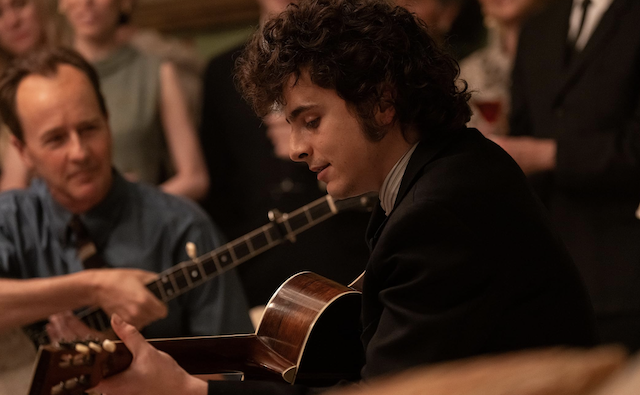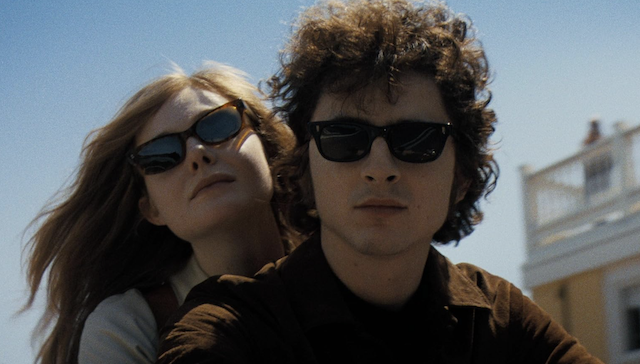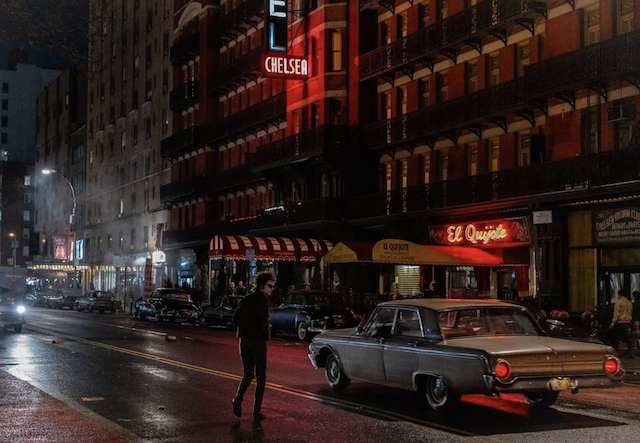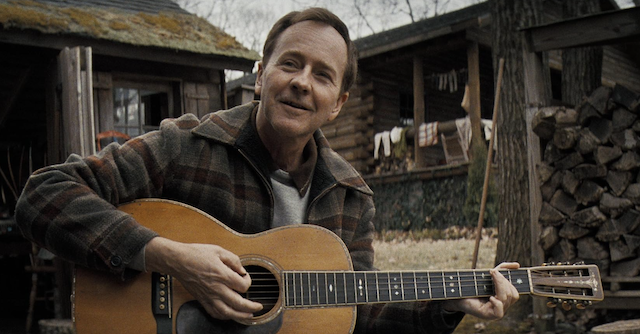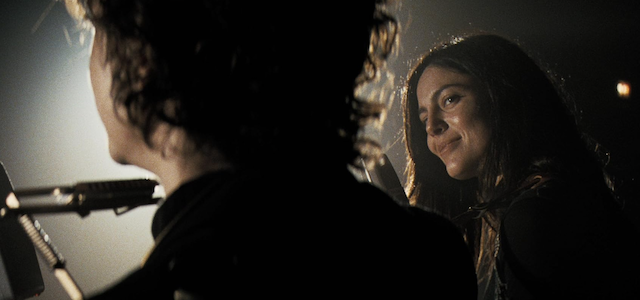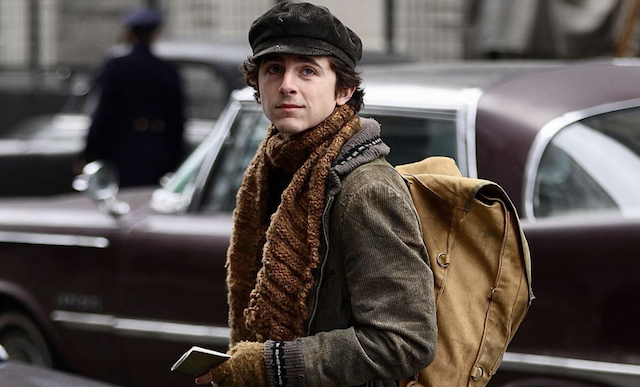
@Courtesy of Searchlight Pictures
A Complete Unknown : New York, 1961. Against the backdrop of a vibrant music scene and tumultuous cultural upheaval, an enigmatic 19-year-old from Minnesota arrives with his guitar and revolutionary talent, destined to change the course of American music. He forges intimate relationships with music icons of Greenwich Village on his meteoric rise, culminating in a groundbreaking and controversial performance that reverberates worldwide. Timothée Chalamet stars and sings as Bob Dylan in James Mangold’s A COMPLETE UNKNOWN, the electric true story behind the rise of one of the most iconic singer-songwriters in history.
Director : James Mangold
Producer : Fred Berger, Bob Bookman, Timothée Chalamet, Alan Gasmer, Alex Heineman, Peter Jaysen, James Mangold, Jeff Rosen
Screenwriter : James Mangold, Jay Cocks
Distributor : Searchlight Pictures
Production Co : Searchlight Pictures, The Picture Company, Veritas Entertainment Group, Turnpike Films, Automatik Entertainment
Rating : R (Language)
Genre :Original LanguageEnglish
Release Date (Theaters) : Dec 25, 2024, Wide
Runtime : 2h 21m
@Courtesy of Searchlight Pictures
Press Conference with Actors Timothée Chalamet, Edward Norton, Monica Barbaro, Elle Fanning, Boyd Holbrook and Director James Mangold
Q: How did this movie about Bob Dylan come about and why this particular time period?
James Mangold: It came about because there was a wonderful book by Elijah Wald that covered this period. He did a beautiful job of bracketing this moment, this convulsion that happened in Newport 1965 and what led up to it. When Jay Cocks and I were developing the script along with our producers and our studio at Searchlight, it occurred to me that this fable should begin with Bob’s arrival in New York. I found it almost like a fairy tale, this idea of a young man changing his name upon arrival with a few bucks in his pocket, carrying a guitar case and a Moleskine notebook with some scrawling in it, landing at the bedside of his hero in a hospital in New Jersey to sing him his song. He has traveled all this way to sing. That this is a true story blows my mind. And to traverse that distance from that moment to the point where he has become one of the most important cultural figures of the century, all in a matter of four years between the ages of 19 and 23, 24? That’s incredible.
Q: Was it daunting and challenging to play a legend like Bob Dylan, performing with the instrument and actually singing? How did you go about that?
Timothée Chalamet: Well, yes and no. It was daunting because it was Bob Dylan. And no, because at the beginning of the process, I wasn’t a fan of Bob the way I am now, the way I’m a humble disciple now. The years I got to prepare for this role is unlike the time I’ve had for any other role. At some point it stopped becoming work and it just became a process of osmosis, just living in the material, living in the world of the Sixties. When it came time to shoot with Edward, Monica, Elle and Boyd, we were constantly throwing around little facts, tidbits, videoclips or letters we were finding about these characters from the period. And yet, we weren’t academic about it. James had his eye on the fact that this is a fable. If you want to listen to the real music, you listen to the legend that is Bob Dylan or the legend that is Joan Baez. We were interpreters trying to bring life to something very special that happened 60, 70 years ago.
Q: How did the strike make things a little more crazy when it came to prepping for the film?
Monica Barbaro: When James cast me in the film, I had five months to learn to sing and play guitar. That did not feel like a long time, although Ed and Boyd had less time than that to do essentially the same thing. I was very anxious. During the strike we weren’t allowed to work with our coaches, but it was this cool time to take the training and process the work, be a little bit more solo with it, stretch and try things on my own. That was around the time when I started working on singing and playing at the same time, which was a whole other level of musical proficiency. I know the strike was intense for a lot of people, but I did ultimately feel lucky to have the benefit of getting a little extra time to work on Joan.
@Courtesy of Searchlight Pictures
Q: Which kind of preparation did you do on your own and how was that elevated when you got to perform and act with your cast?
Edward Norton: I’ve marinated in the Church of Bob Dylan for my whole adult life. If you’re someone who came up in New York City in the theater with an interest in human affairs, Pete Seeger was a paragon. He was a folk singer who cleaned up the Hudson River. My first job as a waiter was right next to a restaurant that was in Pete Seeger’s house. I used to go there all the time. I’ve played guitar for many years, I know this music. Banjo was a new animal for me. They say dying is easy, comedy is hard. I think guitar is easy and banjo is hard. That was a lot of fun. The idea of being invited to play and sing this music, that’s finding gold as an actor, something you’ve never done. James gave us real crowds to sing for and build a relationship with. It was magical. Absolutely magical.
Q: Which were the points of connection to play Sylvie, and what did inform your approach?
Elle Fanning: Sylvie, is based on Suze Rotolo, who was very close with Bob. She wrote a great book, A Freewheelin’ Time, that I read and digested. I wanted to make her someone more than just a girlfriend. She was a huge inspiration to Bob, someone who brought him into politics and encouraged him to sing his own music. You can do the searching, but your Bible is the script: working with your actors, talking to Jim, carving out a cinematic experience that people are going to care about.
I cared so much for her on the page, her emotion just jumped out at me. I didn’t sing or learn any instruments, but to be surrounded by the music they created on set was so helpful for me because the songs are so iconic and emotional, but just to have that, I felt like my vulnerability was opened up and always there. When I would be doing my close-ups or the shots of me in the audience, Timothy would be on stage performing for me. He would give his full performance, I would get to hear him, connect with him and it’s not always that way. James created such a creative space for everyone to feel open, it was a very special experience.
Q: How did you prepare not only to play Johnny Cash, but also to make your performance completely stand out and be separate from Walk the Line?
Boyd Holbrook: It was kind of daunting in the beginning when Jim asked me to do it. Following Joaquin’s great performance, it was daunting. Then as I understood what the part was about and its functionality in Bob’s life, it was a really exciting challenge. For me it was exciting to do it in a fresh way, and to see what this other version of Johnny Cash was, a comrade to Bob. He was the senior in the relationship. The biggest thing with Johnny,he had just this incredible sense of humor of life and how to approach it, and the unwavering voice that he would keep and encourage Bob to keep.
Q: Can you talk about the power of seeing A Complete Unknown in the cinema where it belongs?”
James Mangold: I want all our movies to be seen on the big screen. That’s why we make them. Particularly movies like this where it’s getting harder and harder to get them made. It is a singular experience, our sound team did awesome work on this movie, and it’s an anamorphic film, so it’s widescreen and just looks amazing on the big screen. It’s about sharing. What we get in a movie theater is also our focus. The work of these actors and the work of Bob Dylan itself, watching it flow through on the timeline, I’m very proud. The journey that each of these wonderful actors carry their character through from who you meet at the beginning to who you see at the end is really masterful work.
@Courtesy of Searchlight Pictures
Q: How did your visits to Minnesota inform your portrayal of Bob Dylan?
Timothée Chalamet: They were hugely informative. Again, I don’t think they were informative in an academic sense. I just wanted to put myself in the environment, the weather, the roads, all that gives him that grit in his voice, that makes it so surprising and impressive that he wrote songs like North Country Blues, Rocks, when he was beyond a 19 or 20 year old at the time. Again, it was a process of osmosis. It wasn’t anything prescriptive.
Q: Did you come to an understanding while making this movie of who Bob Dylan was trying to be?
Edward Norton: No. But I don’t want to know. There’s got to be some people who want the mysticism, the power of the magic trick. Next to the songs themselves, the thing I admire the most about him is that somehow, as a 22-year-old, he understood that there was no value in answering these questions. “I don’t know what it means.” “I wrote it. What do you think it means? You know what I mean?” That’s a mystic, that’s a shaman. People don’t have the density at that age to understand those things, and he did. I don’t want to meet him. I don’t want to know him, and I don’t want to know anything about what’s in his mind because it’ll only reduce the potency of what he’s given me.
Q: Do you feel like you have a little bit more of an understanding of who Bob Dylan was trying to be?
Timothée Chalamet: Edward said it perfectly. I think Bob is focused on his rhythm, his art, not feeling the need to explain himself. It’s important to note that from the start, he’s engaged with his art. He doesn’t feign total engagement with other characters. He’s about his work and his music.
@Courtesy of Searchlight Pictures
Q: What was it like for you filming in front of that audience during the filming of the Newport stuff?
Monica Barbaro: I was very nervous about performing in front of people live. My first song was Don’t Think Twice, and that was solo. When we first shot it, the entire crew was behind me filming it, so I didn’t feel entirely alone up there on stage, which was nice. That was the day after I spoke with Joan. I paid a homage and I felt like I was able to be present with what Jimmy did. He told me to have more fun with it. Getting to play with Timmy in a room for our first rehearsal was just magical, hearing our studied versions of the songs, our harmonies coming together, our accompanied guitars. To hear that cohesive sound was lovely.
Edward Norton: Sometimes we make films, the days you want to advance, you want to move along. I can’t think of many experiences I’ve had on a film where I really hoped Jim was going to say, “Let’s just go all the way back to the beginning,”
Boyd Holbrook: It was my second day of working. I think so. I remember it as this train of people. I came on, did the Folsom Prison Blues and Big River. You come out and announce and then Bob comes on.It was just this long taste of iconic music. That’s all about the preparation of just getting there.
Q: What was it like for you to see Timothée absolutely in character?
Elle Fanning: The first day on set for me was when he’s singing “A Hard Rain’s Going to Fall.” I am an audience member in that scene, I don’t have any lines or anything, I remember I had such an anticipation, like butterflies, I was so excited. I actually hadn’t seen him yet in hair and makeup. The camera was behind me at that point. I didn’t know what to expect. Obviously I know he’s a brilliant actor, and I was like: “Of course he’s going to knock it out of the park.” I never doubted him, but when I saw him walking on stage, he gave us a full concert. It was just so beautiful to see. It was beautiful seeing parts of Timothée that he’s brought into his role. I don’t know, it moved me. I had tears rolling down.
Q: How did your experience of directing Walk the Line influence your approach to A Complete Unknown?
James Mangold: It gave me confidence about instincts that I had, things I had tried on that movie that I wanted to go even further with. The confidence I had, which then got matched by Timmy’s ambition and discipline, made it possible for me to clear the way for the idea that everyone would sing their own parts and play their own parts. Timmy took it up another level. The first scene with singing in it that we did was the one in which he sings a song to Woody Guthrie in the hospital. Timmy came to me and said, “I just want to do it.” And he did. There was nothing to fix later. He was not only marvelous in that scene, he also proved the validity or the method to the madness, because there were ways he bent the song that he never could have done if he was listening to something in an earwig. There were choices he made that he was free to act even in the same way with the music as one would with the dialogue or action. It was such a powerful lesson to me.
@Courtesy of Searchlight Pictures
If you liked the press conference, share your thoughts below.
Check out more of Adriano’s articles.
Here’s the trailer for a Complete Unknown:


